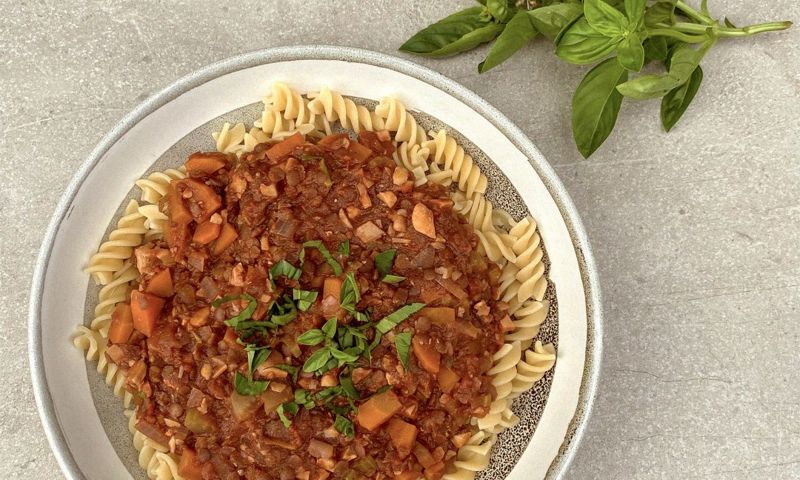Published 11 Feb 2025
It’s the dream for most to wake up feeling refreshed and say “I slept like a log”. While for some, sleep comes easily, for many it can often feel like a skill we forgot to learn.
There’s a saying that “sleep is the golden chain that ties health and our bodies together”. If you are what you eat, there are pointers for eating that can help you get a better night’s sleep.
Healthier Together recently spoke with nutritionist Mel Bald about the science of sleep and the impact that diet can have on our ability to get some decent shut-eye.

Why are sleep patterns important?
Sleep is our time for restoration. We clear out the brain, there is consolidation of our memories, our body is undergoing tissue repair, and also dealing with inflammation. There’s a lot going on that we don’t necessarily notice on a day-to-day basis, but they’re all very important processes. Without a good night’s sleep our body can’t get through the cycles needed for restoration.
There are a few factors that influence how much sleep we need, like age, genetics, and chronotype (which is whether you’re more of an early bird or a night owl). The consensus is that the majority of people will need somewhere between 7-9 hours sleep to ensure their bodies get the restoration they need.
Sleep patterns are also impacted by our circadian rhythm. This is the natural internal process that regulates our sleep-wake cycle, and it is highly affected by light.
The light and dark influences when your brain makes a hormone called melatonin. This is the hormone that makes our body sleepy so it makes sense that our melatonin naturally starts increasing towards the end of the day, and as it gets darker. That’s why there’s always recommendations to reduce bright lights and screens at the end of the day, to aid the production of melatonin.
Our stress hormone, cortisol, can interfere with the production of melatonin. Cortisol and melatonin work in opposites. If one is high, the other is low. So if you go to bed and you have high cortisol because you are worrying about things and have a lot of stress going on, then the melatonin production will be lower, and it will make it harder to sleep well.
Since we need the cortisol levels to be lower at night, we want to reduce stress at this time of day. Doing things like deep breathing, meditation, or any other things to help reduce stress, like having a cup of calming herbal tea will assist with sleep.
How does our diet affect our sleep quality?
There are a number of ways that diet influences our sleep, including:
- the regulation of sleep hormones
- stabilisation of blood sugar levels
- eating foods that are classed as stimulants
- the timing and composition of meals.
There are many foods that can help us produce the sleep hormones seratonin and melatonin, which help us to get to sleep, as well as have a higher quality sleep.
Protein has a number of benefits in regard to sleep. Having enough protein spread across the day and at dinner will ensure a steady blood glucose level. This helps to reduce nighttime waking as it prevents a drop in blood sugar which can cause people to wake up.
Some protein foods contain tryptophan which helps to boost our melatonin. This is an essential amino acid that our body can’t make, so we need to get it through our diet. Protein foods that contain tryptophan include turkey, chicken, dairy, pumpkin seeds, and oat bran.
Healthy fats are also important for our sleep. Research has shown that people who consume oily fish (such as salmon, tuna, sardines) three times per week had better overall sleep as well as improved daytime functioning. These foods have both omega 3 and vitamin D which help to regulate serotonin and therefore sleep regulation.
Carbohydrates can have a beneficial role in promoting sleep by enhancing the uptake of tryptophan, and increasing serotonin production, stabilising blood sugar levels, and reducing the time it takes to fall asleep.
However, you don’t want to be having big bowls of pasta or piles of rice. You need to be choosing complex carbohydrates which provide a steady release of energy and help stabilise blood sugar levels. So foods like quinoa, buckwheat, brown or black rice, whole rolled oats, sweet potato, pumpkin, lentils, and chickpeas. Carbohydrates that have lots of fibre and are less processed.
There’s some great recipes to support sleep in our meat-free Monday guide.
Are there specific foods that can help with sleep?
There are a few foods that have had some sleep-specific research done on them.
Kiwi fruit naturally contain both melatonin and serotonin and there has been research showing that consuming two kiwi fruit one hour before bed for a period of four weeks helped people to fall asleep faster, sleep more and have better sleep quality. So that’s a nice easy one to add to your routine and the bonus is kiwi are also high in vitamin C, which can help ward off colds.
Tart Montmorency cherry juice is a natural source of melatonin and has been shown to increase sleep time by nearly 90 minutes among older adults with insomnia when they consumed it regularly for two weeks. You can’t just choose any cherry juice though; you need the Montmorency one as the others don’t have the same nutritional profile.
Herbal tea that contains chamomile and lemon balm are known for their mild sedative properties. It is also a really nice way to wind down before bed and reduce stress by turning off the screens and having a warm cup of tea.
What other strategies can we use to improve our bedtime routine and help with better sleep?
- Making sure you don’t eat too late at night, because you don’t want to be digesting food while you’re trying to sleep. Aim to finish eating around three hours before bed.
- Minimising light exposure in general – whether that be screens or house lights.
- Dropping your core body temperature by having a warm bath or shower to help you fall asleep easier.
- Making sure your room temperature is comfortable and isn’t too hot or cold.
- Ensuring you’re going to bed relaxed so the cortisol isn’t interfering with sleep – doing some deep breathing or relaxation meditation can help with this.
- It’s also really important to have consistent wake and sleep times as this helps our body to fall into a rhythm.
- When you wake in the morning, seek sunshine (if you can find it!) or at least daylight as this helps to support our circadian rhythm and melatonin production.
Learn more about sleep
- Sleep and mental health – Q&A with Professor Michael Berk
- How to sleep better: Science-backed sleep hacks
- Infant sleep and settling
- Sleep disorders – what are they and what are the treatment options
What about specific foods that can hinder sleep?
Any foods that contain stimulants like caffeine, such as coffee, energy drinks and chocolate can affect sleep. I recommend to not overload on caffeine and ideally not have any coffee after midday. Saying this, some people do metabolise coffee differently due to their genetics, and these are the people that seem to be able to have a coffee in the afternoon or evening and still sleep well.
Alcohol is the other one. Although it can send you off to sleep, it causes fragmented sleep and wake ups in the night as it starts to be metabolised in the liver. It’s been found that even low amounts of alcohol can decrease sleep quality.
Is there anything else to consider in eating for sleep?
There’s a lot of research coming out on gut health. Links have been found between the range of good and bad bacteria in your gut and how well you sleep.
The greater diversity or range of bacteria in your microbiome, and the greater the number of beneficial bacteria you have correlates with better sleep.
How to help improve your gut bacteria:
- Increase the diversity of gut bacteria by eating a diverse range of plant foods. Aiming for 30 different colourful plant foods a week is ideal.
- Having prebiotic foods daily which feed our good bacteria. These are things like garlic, leek, onion, asparagus, flaxseeds and oats.
- Including probiotic foods to help increase our numbers of good bacteria – foods like yoghurt, kimchi, kefir and miso.
- Exercise also helps to increase the diversity of your gut bacteria. Exercise has also been directly linked to better sleep.
How do you set yourself up for a good night’s sleep?
- Start the day with a breakfast that will balance your blood glucose. Try whole oats topped with nuts, seeds, blueberries and yoghurt to get some fibre and protein
- Add veggies to your lunch
- Eat dinner around 6:30pm to allow time for digestion – try finishing your meal with a kiwi fruit!
- Incorporate movement into your day
- Create a bedtime routine. Switch off screens 30 minutes to one hour before bed, have a cup of herbal tea, a warm bath or shower and do some deep breathing.
Want even more?
Visit Healthier Together podcasts to explore this and other podcasts in the series.
Find more nutrition advice from Mel Bald including healthy eating and recipes to try.



